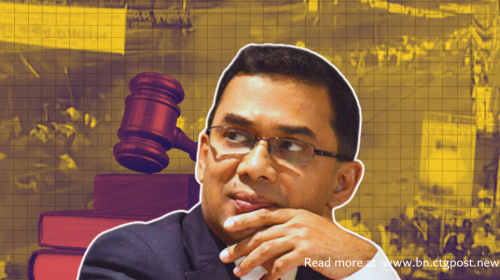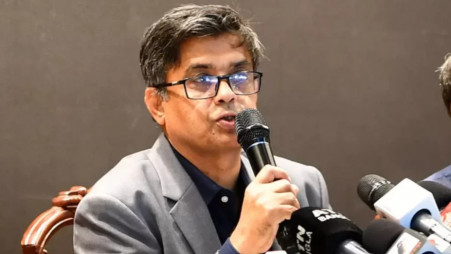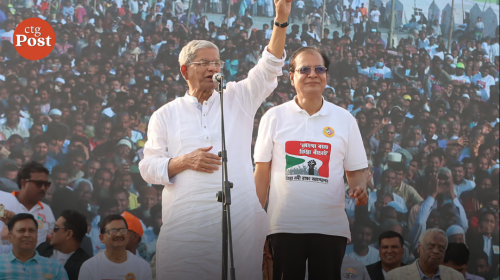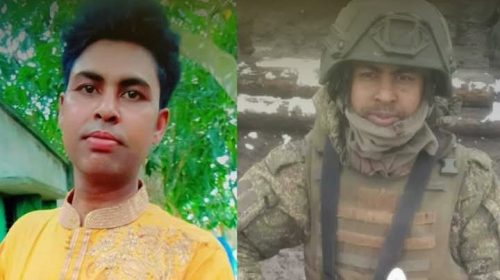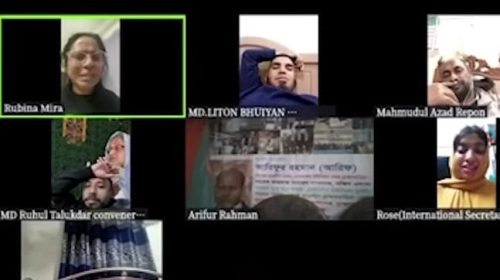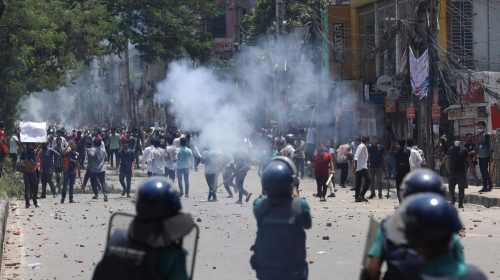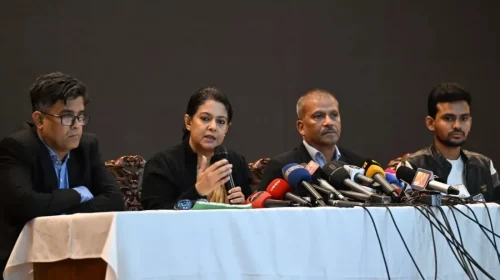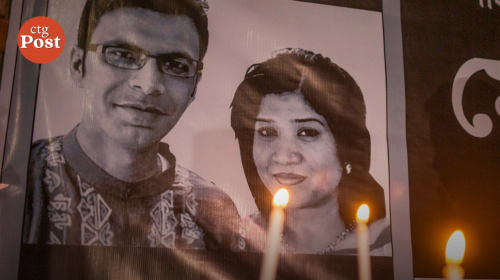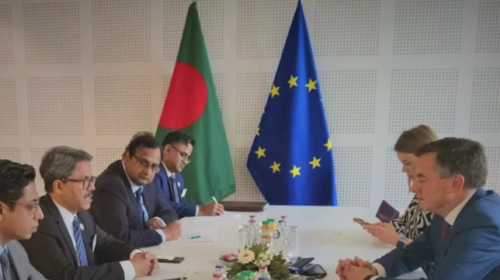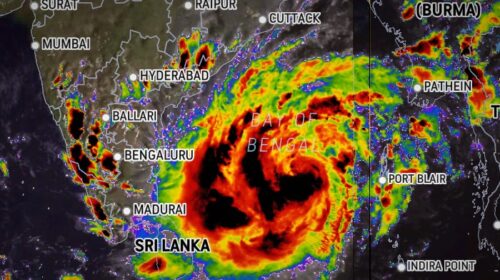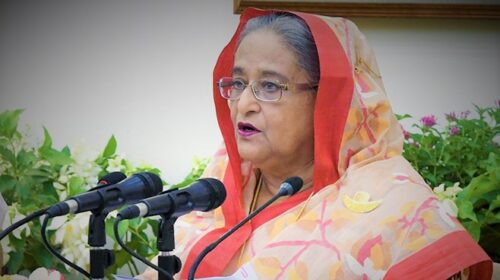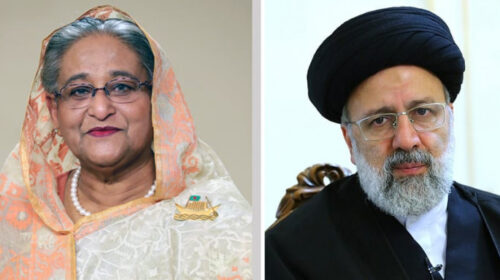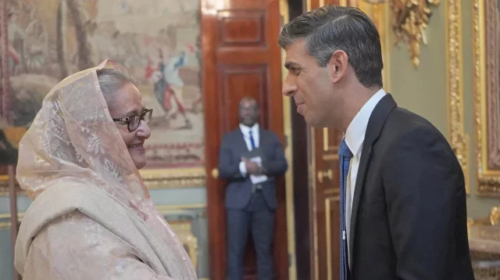The man, convicted of shooting Bangladesh’s founder Bangabandhu Sheikh Mujibur Rahman dead, sped away as Canadian national CBC TV network approached him for comments on his role in the assassination and the story he told the Canadian officials for his protection.
“Sir, if we could just have . . . just a quick conversation . . . I just want know if you have been truthful with Canadians about your role in the assassination,” a CBC TV journalist was seen asking someone onboard a white SUV car, which was about to get started.
The man was one of fugitive convicts, sacked major Nur Chowdhury, while CBS TV’s investigative journalist Mark Kelly described him as someone who pitted Canada against Bangladesh as he was living in Canada for the past 27 years.
In reply to the CBS TV journalist’s question, the killer was heard saying “just a second, just a second, I have an (indistinct chatter)” and then hastily maneuvered the car and subsequently sped away. The report also showed a glimpse of him on the balcony of an apartment in Toronto.
The presenter and colleague at that point were seen to run after Nur’s car few steps in their attempt to persuade him to stop and talk and then Kelly commented “after 27 years living freely in Canada, it seems he has nothing more to add”.
Most plotters of the August 15, 1975 putsch fled the country in 1996 when the general elections brought Bangabandhu’s Awami League back to power while until then they were protected from justice under an infamous indemnity law.
Nur took refuge in Canada and continued to live there a quiet life and for years his whereabouts were unknown.
The CBS TV’s popular investigative segment The Fifth State aired the 42-minute documentary two days ago with a title — Assassin Next Door – questioning “Why the killer of Bangladesh’s first president is free in Canada”.
Returning to power after exhausting 21 years in a political wilderness Awami League scrapped the Indemnity Act to expose the killers to justice while after a protracted legal process Noor and 11 other sacked military officers were sentenced to death and six of them were hanged so far.
The rests were on the run abroad while the government later confirmed one of them to have died a natural death while he was in hiding in Zimbabwe.
Bangladesh authorities could confirm the current abode of another convict sacked major Rashed Chowdhury in the United States while the Interpol had issued a red alert for the fugitives as part of efforts to track them down.
In a comment to the Canadian TV network years ago, Nur, however, said he was not at the carnage scene at the time when Bangabandhu was killed along with most of his family members. “That’s not true, I wasn’t there. I was nowhere near that place,” he told in an audio comment to the TV, visibly evading his personal visual appearance on the TV screen.
Kelly, who made the documentary talked to the key-people relating to the Bangabandhu Murder Trial, and all of them binned Nur’s claim with Bangabandhu’s daughter and incumbent Prime Minister Sheikh Hasina calling it an “absolute lie”.
Current Law Minister Anisul Huq who was a key prosecution lawyer in the trial alongside his lawyer father Serajul Huq, chief police investigator of the case Abdul Kahhar Akand and the current CID chief who preserved the case documents also rejected Nur’s denial.
They said most of his co-accused who faced the trial in person described Nur’s role during the investigation process.
Extradition issue
The documentary focused mainly on Nur’s extradition issue and unearthed that in 2002 the Canadian Immigration and Refugee Board (IRB) had ruled he was a “fugitive from justice” and his alibi was “simply implausible”.
The then Canadian minister for public safety Stockwell Day appeared in the documentary and said he had reviewed Nur’s file and strongly felt “he shouldn’t be here (in Canada)” and then his office went to the Canadian court supporting the IRB decision to send him back to Bangladesh.
According to the legal procedure a decision was made that Nur must go back home.
“But (Nur) Chowdhury had a last lifeline. Five years earlier the Supreme Court ruled it was violation of charter of rights to deport any from Canada who faced death or torture back home,” the documentary presenter commented.
He said Nur took the advantage of the ruling saying that would exactly happen to him if he was deported, prompting Bangladesh to go to Canadian federal court to know his legal status while the court “ordered Canada to rethink its position”.
Canadian government then informed Bangladesh that while “there may be benefits in disclosing information regarding Nur Chowdhury, those benefits do not take precedence over Canada’s stance regarding death penalty”.
“(But) there is one important loophole to that stance. The Supreme Court ruled people could be sent to their deaths under exception circumstances,” the presenter commented reviewing the ruling.
Kelly interviewed a senior law professor of Dalhousie University Robn Currie, a specialist on international criminal law, who said “in this area of law, it’s probably the most mysterious phrase that there is”.
Currie said when the court first formulated the phrase, “some people called it the bin Laden clause, meaning if someone like Osama bin Laden were to show up in Canada, we would overcome our aversion to the death penalty and say in the greater interest of justice, this person should be extradited or deported”.
The law professor said he thought the Canada was in an uncomfortable position with Nur being in Canada.
The presenter posed a question for the audience if taking part “in the assassination of a world leader and 21 members of his household including a 10-year-old boy” (Bangabandhu’s son Sheikh Russell) were an “exceptional circumstances” and added “it’s a clause that has never been tested before”.
Bangladesh High Commissioner to Canada Khalilur Rahman told the presenter that Dhaka wanted Canadian authority to take the case before their Supreme Court and “if your Supreme Court says that no, he cannot be deported, we will accept. And then we can take the other options”.
Asked why Bangladesh was not taking the other options now, a visibly frustrated envoy said “they (Canadian authority) are not talking”.
“We need to talk, we need dialogue,” Rahman said.
Currie, the law professor, called the silence of the Canadian authority “the missing piece”.
Going back to Canada’s former public safety minister, the presenter sought his opinion if Canada was harbouring an assassin or standing up for human rights.
In reply Stockwell Day said Canada would be standing on a “moral high ground” by saying “He (Nur) is accountable for what he has done and we should negotiate with Bangladesh to see how we can get him out of here and put him back in the hands of people of Bangladesh”.
The documentary then showed Nur working in the garden on the balcony of what appeared to be his apartment when the presenter commented “far from the diplomatic crossfire, Nur Chowdhury carries on his quiet life”.
Kelly and his TV crew then visibly awaited Nur to descend and get on his white SUV car to be approached with his question, which he evaded, speeding away.
The presenter is then seen at the Dhaka residence of Huq, who previously stood as a lawyer for prosecuting Nur in absentia for the murder of Bangladesh’s Father of the Nation and now fighting for his extradition as the law minister.
Kelly asked him if he believed Nur had got away with murder and after a momentary pause, the reply came with a smile on Huq’s face.
“So far . . . yes. So far yes, but we will see to the end,” Huq said.


